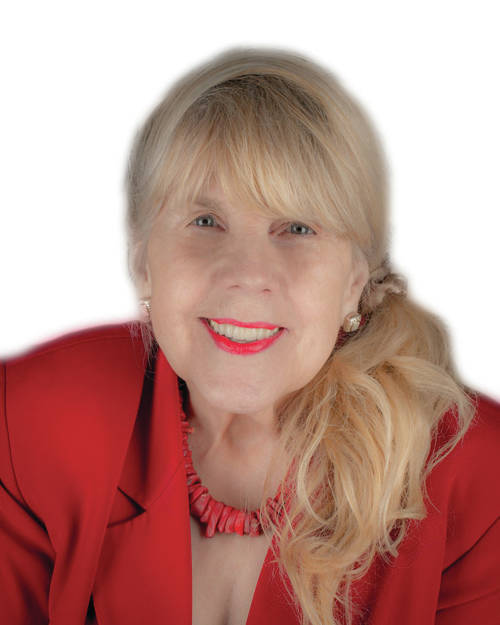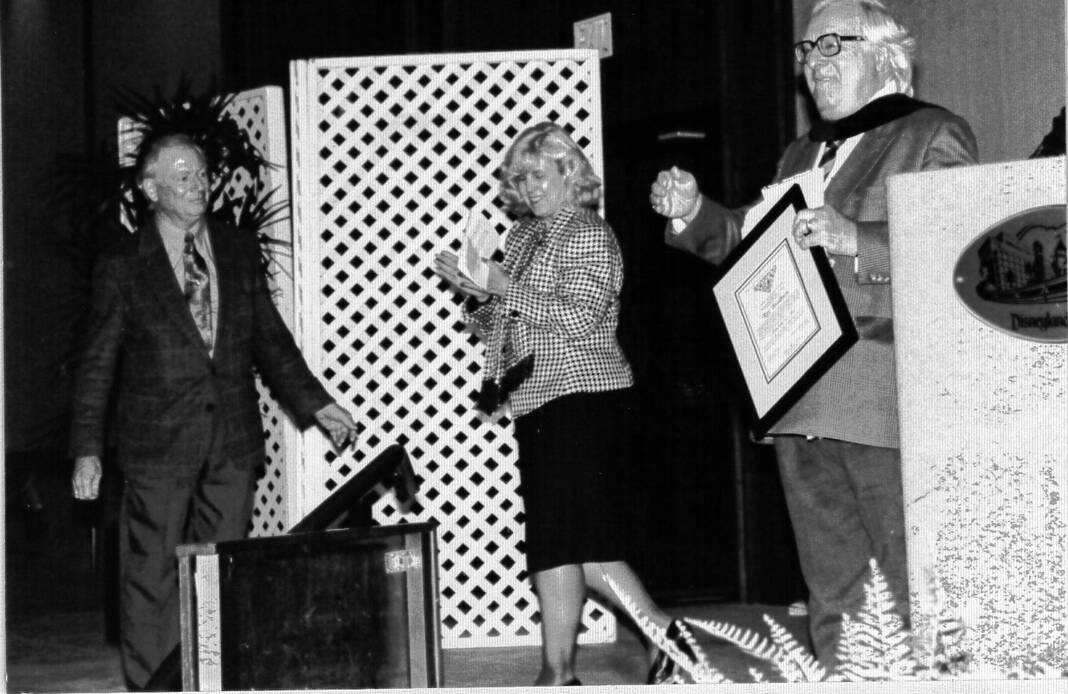

As chancellor of Rancho Santiago College District in the 1990s, Vivian Blevins awards famous American author Ray Bradbury (1920-2012) an honorary college degree as Professor Jim Christian looks on. Bradbury served as guest lecturer for many years in Christian’s course entitled “The Theatre of Ideas.”
Provided photo
By Vivian Blevins
Contributing Columnist
A headline in the April 5, 2022, issue of the Dayton Daily News indicated “U.N.: Earth ‘firmly on track toward an unlivable world.’”
When I was president of Lee College from 1986 to 1992 in Baytown, Texas, a suburb of Houston, Exxon had one of the world’s largest refineries there as well as a chemical plant. I still recall the smells and the air pollutants dispersed regularly (and I’m sure in compliance with federal standards) and my son Lance’s discovery of malformed small animal life in the streams in his neighborhood.
I met frequently with other presidents in the Gulf Coast area, and early on I made the mistake of saying, “This area is obviously heavily polluted because I can smell it in the air.”
In response, a very powerful and long-established president said, “Dr. Blevins, that is the smell of money,” And he gave me a look that said, “Keep your mouth shut and you might be successful here. Otherwise….”
I had recently completed my first presidency in the coalfields of southeastern Kentucky, so I certainly understood the need for a major source of employment which mining coal provided there. I knew as well that coal mining was responsible for the success of all the support services — and jobs — that an industry requires: schools, grocery stores, pharmacies, libraries, and medical facilities. I also understood the dangers of coal mining, not only in terms of mining accidents but silicosis, aka Black Lung, as I had watched my father-in-law die from the disease and knew that kind of smothering death is a dear price to pay for a job in mining coal.
United Nations Secretary General Antonio Guterra’s bleak comments, based on a report from its intergovernmental climate panel, is a subject difficult for many Americans to even notice among the news stories on the war in Ukraine, the Supreme Court wrangling, and food/gas prices. According to Associated Press reporters Frank Jordans and Seth Berenstein, Gueterra indicated that governments and corporations have “stoked global warming by clinging to harmful fossil fuels.” They quote him as saying of the multi-page report, “It is a file of shame, cataloguing the empty pledges that put us firmly on track for an unlivable world.”
It’s difficult, if not impossible unless they are directly impacted, for Americans to think of the “increases in disasters such as flash floods, extreme heat, more intense hurricanes and longer=burning wildfires.” This is true to acknowledge even if we know our employment is contributing to global warming. Yes, we care about persons impacted by these natural disasters — or are they man-made disasters? We pray for them and donate to the myriad groups that attempt to alleviate their personal and financial pain even as we wonder why our income tax dollars are not being used to address these issues in a competent fashion.
Jordans and Berenstein write that “the solutions recommended are a rapid shift away from fossil fuels toward renewable energy such as increasingly cheap solar and wind power, the electrification of transport, less meat consumption, more efficient use of resources and massive support for poor countries unable to pay for such measures without help.”
As a pragmatist, a problem solver, I believe these are good suggestions and doable with leadership and money, but I would follow them up with a few questions:
· Who is going to be paying for the “massive support for poor countries?” We are aware of tax loopholes and outright fraud that keep some individuals and corporations from paying any taxes or only token amounts as we faithfully pay our own local tax bills that have a rather long itemized lists for schools, parks, libraries, cities, etc. Perhaps we need such lists with our state and federal tax bills. Are your lips snarled yet, or are you laughing aloud?
· We’d like to have electric cars, but since the cost is prohibitive for most of us, I guess we’ll just need to keep driving our old gas-guzzling, polluting ones.
· Will retraining be provided and by whom to move Americans from current employment in fields that support fossil fuels? Will these individuals be relocated at a distance from their extended families and support systems?
· Yes, we can eat less meat and that is easy for those of us who are not fans of meat. What about those who earn their living raising beef cattle, hogs, and other meat sources? What about those who process meat for the marketplace? How will we provide for the uprooting, retraining, and placement for these groups?
· We should all be able to get on board with “more efficient use of resources.” We control the thermostats in our homes; our use of water; our buying choices of food, clothing, furniture, vehicles; our use of gasoline to a degree unless our jobs absolutely require travel and carpooling is impossible; the size of homes we build/buy; the items we recycle, etc.
A solution posed is the development of a way to remove “vast amounts of carbon dioxide- the main greenhouse gas- from the atmosphere.” Maybe some of these folks who are currently spending millions on little sight-seeing trips to outer space could pay appropriate taxes, and we could get scientists collaborating on this proposed solution.
As a start, I think we all could do what we can and spend less time bickering and more time using our critical thinking skills to solve problems in our homes, our workplaces, our cities, our states, and our country.
In conclusion, I’ve recently been rereading Ray Bradbury’s stories in The Illustrated Man, and the predictions in his fiction seem strangely timely.
Vivian B. Blevins, Ph.D., a graduate of The Ohio State University, served as a community college president for 15 years in Kentucky, Texas, California, and Missouri before returning to Ohio to teach telecommunication employees from around the country and students at Edison State Community College and to work with veterans. Viewpoints expressed in the article are the work of the author. The Daily Advocate does not endorse these viewpoints nor the independent activities of the author.




